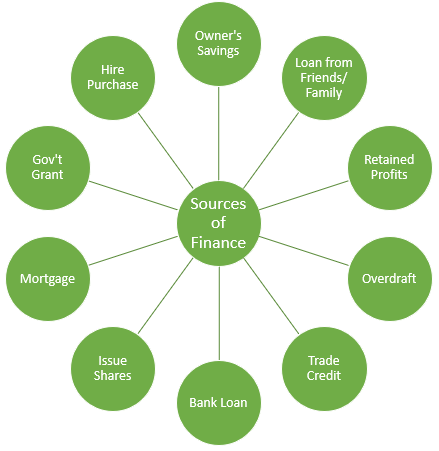Businesses need money to be able to pay bills, employees, buy machinery, equipment and raw materials. This money may eventually come from sales made, but in the beginning businesses may have to rely on different sources of finance.
Different types of businesses can raise different sources of finance, though some are accessible to all types of businesses. The source of finance used depends on what the finance is for, and how long it is required for.
Owners Savings
An amount of money is borrowed from the bank, then repaid (with interest) over a set period of time
Advantage
- No need to pay interest on the money
Disadvantage
- Risk of losing investment if the business fails
- Owner may not have enough funds to meet the needs of the business
Bank Loan
Money put into the business by the owner
Advantage
- Can be paid back over a period of time
Disadvantage
- Paid back with interest
Mortgage
Long term loan provided by a bank in order to buy property (only method to buy property other than cash)
Advantage
- Structured repayments over a long term (25 years)
Disadvantage
- Paid back with interest
Government Grant
Money given to the business by the government. Used to help finance new projects – especially those that create new jobs
Advantage
- No Need to pay back the grant
Disadvantage
- Can be difficult to obtain as you need to meet certain criteria to qualify for the grant
Trade Credit
Items are bought from suppliers on a ‘buy now pay later’ basis
Advantage
- Gives the business more cash to use in the immediate future
Disadvantage
- Can only be used to buy certain goods and bills usually have to be settled within 30,60 or 90 days
Hire Purchase
An item is bought on credit – repayments paid each month until the final payment and only then does the item belong to that person/org
Advantage
- Cost of purchasing expensive item is spread over a long period of time
Disadvantage
- High interest rates charged

